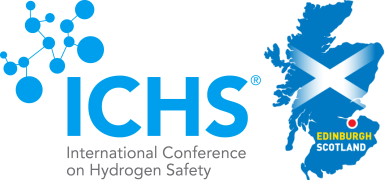ICHS 2023 – September, 19-22 2023
ICHS 2023 will be held in Quebec City, CA
Looking forward to see you!
The Scottish Government and IA HySafe invite you to the unique
INTERNATIONAL CONFERENCE ON HYDROGEN SAFETY 2021
“Safe Hydrogen for Net Zero”
21-24 September 2021
ONLINE CONFERENCE
Supported by The Scottish Government
WITH THE ENDORSEMENT OF:
IN COLLABORATION WITH:
REGISTRATION IS OPEN!
- Conference registration is open at https://hysafe.evessiocloud.com/live/en/page/home
- Member discount of £50 (reducing price to £260) is available with coupon code reserved only to HySafe members
- To obtain the discount members must register and pay by 31st July
- Presenters must register before 15th July for their paper to be included in the conference
COVID 19 IMPLICATIONS
Conference will be held in Virtual mode with potential, for some, in person attendance in Edinburgh, depending on the Covid 19 situation.
Only at the end of August, beginning of September, the situation will be clearer. This opportunity will be quickly communicated.
The continuity of ICHS biennial conferences and their scientific content will be guaranteed with the publication of the ICHS2021 Proceedings, which will join the more than 1000 articles that are part of the memory of ICHS series.
About ICHS 2021
The Scottish Government and IA HySafe invite you to take part in ICHS2021 which will be about “Safe Hydrogen for Net Zero”. This ninth International Conference on Hydrogen Safety (ICHS 2021) will be held in Edinburgh, Scotland on 21-24 September 2021 under the auspices of the International Association for Hydrogen Safety (IA HySafe). The first eight ICHS biennial conferences from 2005 to 2019 attracted experts from all over the world, and provided an open platform for the presentation and discussion of new findings, information and data on hydrogen safety – from basic research to applied development and from good practice to standardisation and regulatory issues.
Hydrogen is now beginning to play a greater role in the transition to clean, safe and sustainable energy systems. As part of “Net Zero Applications” hydrogen solution will address industrial heat and feedstocks, commercial and domestic heat, energy storage & energy transportation, and decarbonised clean transport throughout regions and across continents.
In May 2019 the Scottish Government announced the ambition to become Net Zero by 2045. In Feb 2020 the Scottish Government commissioned a wide-ranging assessment to appraise the potential of hydrogen to be deployed within the Scottish energy system, to help achieve those challenging decarbonisation targets. The findings of the hydrogen assessment work and other studies will identify Scotland’s strengths in a hydrogen economy and help inform the development and delivery of a Scottish Government Action Plan for Hydrogen and a Hydrogen Policy Statement.
This further reinforces Scotland as one of the leading locations for deployment of hydrogen and fuel cell solutions into developing low carbon energy systems. Highlights include the expanding hydrogen bus fleet in Aberdeen and along with many other innovative projects in locations such as Fife, the Western Isles, and the Orkney Islands. These projects are leading the way with a ‘learning by doing’ approach, and are willing to share best practice and experience.
The overarching theme for ICHS2021 is therefore “Safe Hydrogen for Net Zero” and will address a wide range of hydrogen safety topics including: safety of large production and supply chain infrastructure, hydrogen and hydrogen carrier behaviours, physical effects, consequence and risk analysis, incidents, accidents and near misses, hydrogen effects on materials and components, safety of energy storage, power to gas/gas to power related safety issues, safety solutions for the implementation of hydrogen technologies, risk management, best practices, regulations, codes and standards, as well as communication strategies for wider public awareness and acceptance of hydrogen.
All contributions to ICHS2021 will be evaluated for their scientific content and relevance to the wider uptake and deployment of safe hydrogen as part of the transition to a low carbon energy system.



